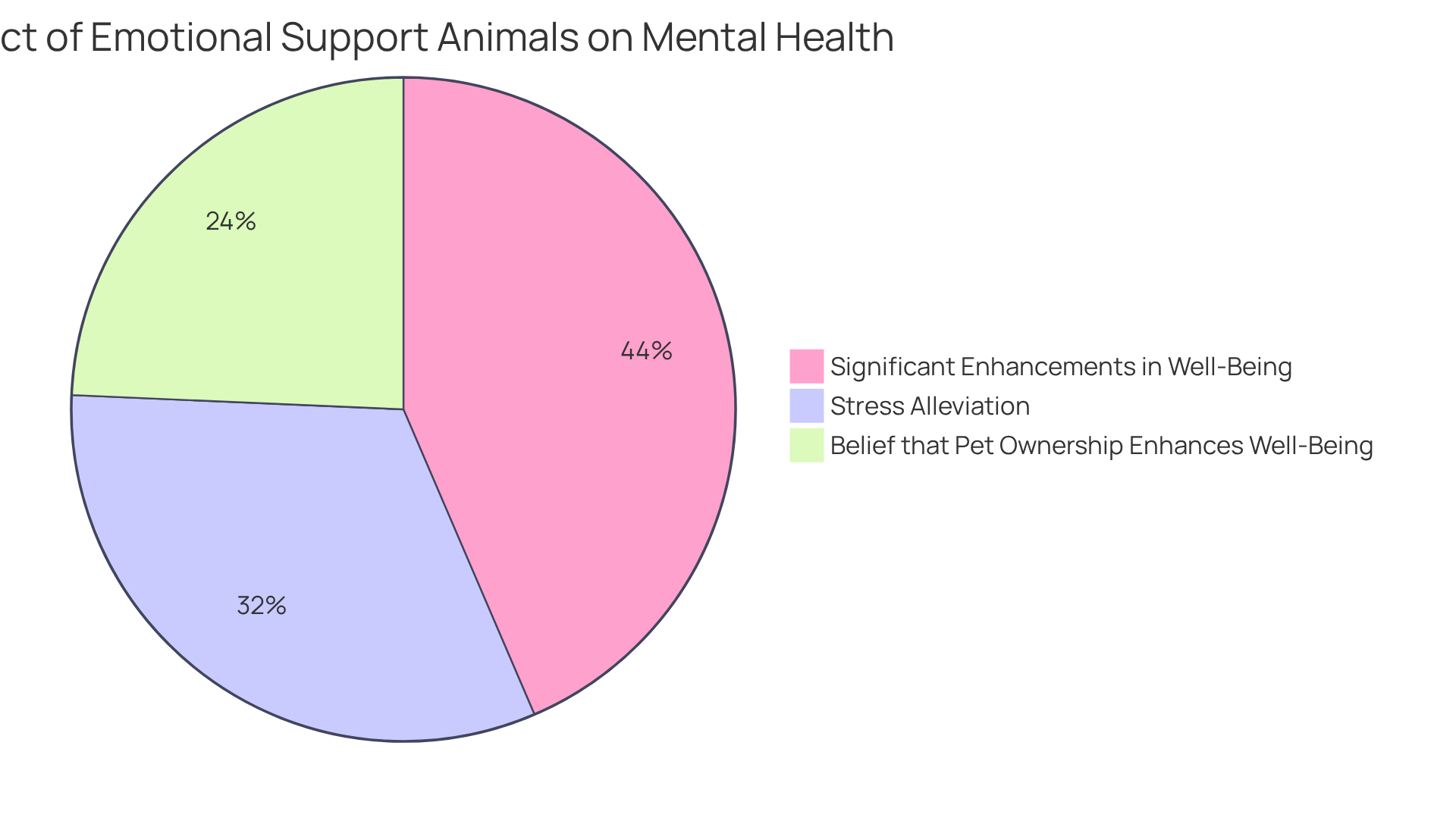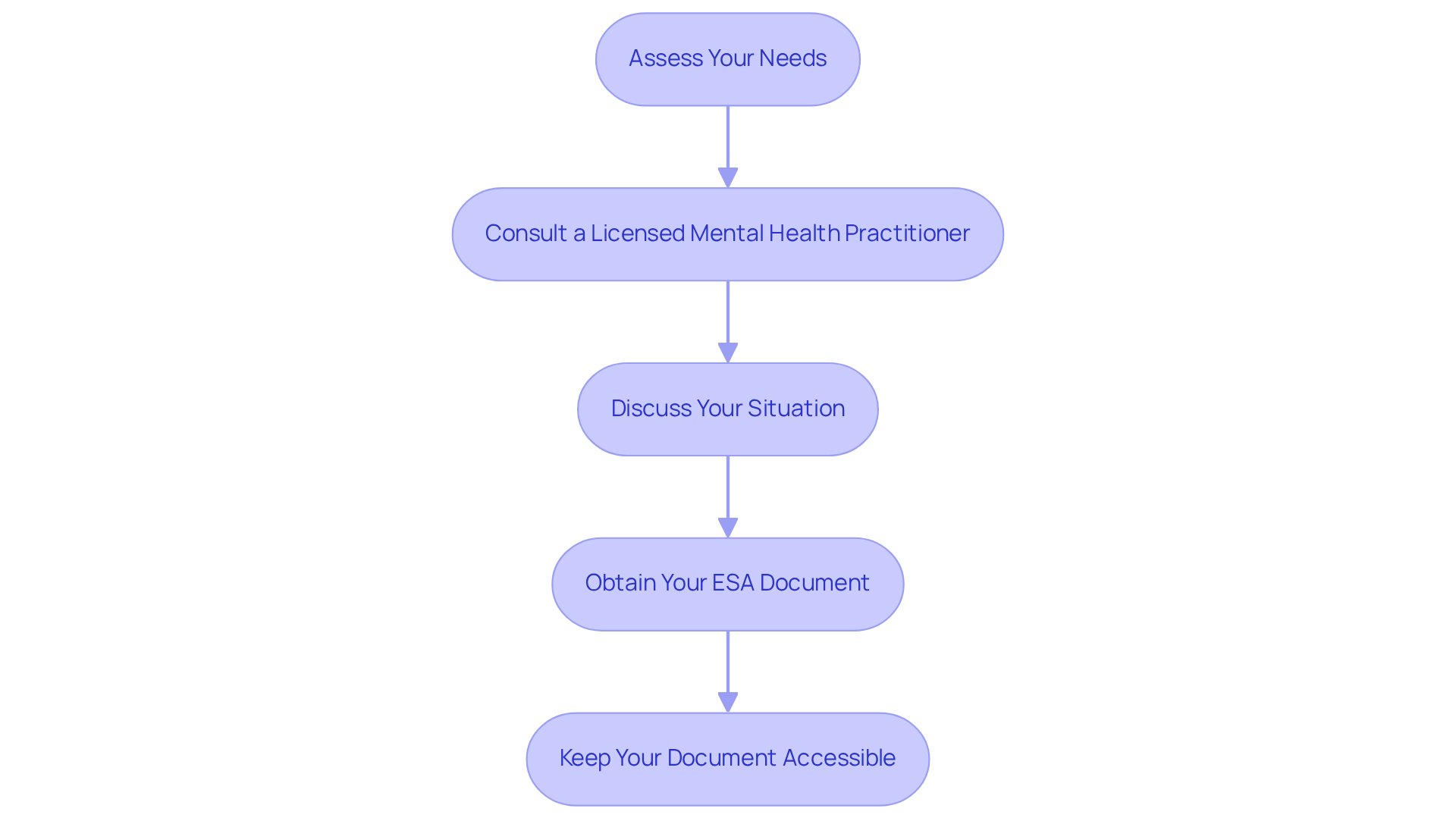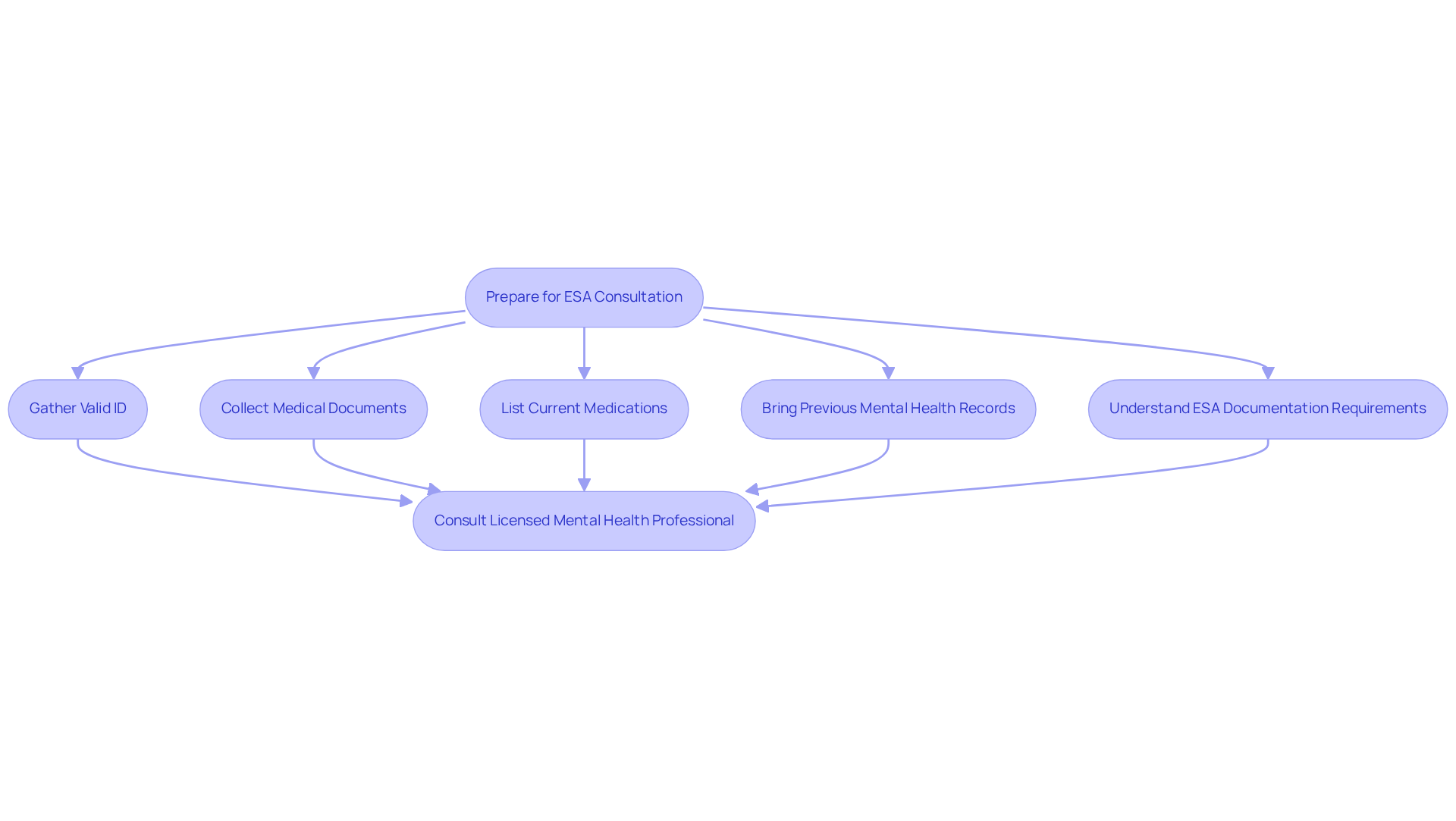

5 Steps for Getting an Emotional Support Animal Today
by Lena Park
Last updated: July 9, 2025
Verified and Approved by:
Angela Morris,
MSW, LCSW
Fact Checked

Overview
This article presents a compassionate five-step process for obtaining an emotional support animal (ESA) letter. It recognizes the emotional challenges individuals may face and emphasizes the importance of understanding one’s emotional needs. Consulting with a licensed mental health professional is a crucial step, as it allows for a deeper exploration of these needs. Gathering the necessary documentation is also highlighted, ensuring that the process is as smooth as possible.
The positive impact that ESAs can have on mental well-being is well-documented, offering comfort and companionship during difficult times. This structured approach not only provides guidance on obtaining an ESA letter but also addresses the challenges of housing and travel that may arise when one has an ESA.
If you find yourself feeling overwhelmed, remember that support is available. The journey toward emotional well-being can be daunting, but taking these steps can lead to a more fulfilling life with the loving presence of an ESA by your side.
Introduction
Navigating the emotional landscape can feel overwhelming, particularly for those who are battling anxiety, depression, or a sense of isolation. The journey can be lonely, but Emotional Support Animals (ESAs) have emerged as cherished companions, providing comfort and companionship that can profoundly enhance well-being. This article explores the essential steps to acquire an ESA, shedding light on the transformative benefits these animals offer while also acknowledging the challenges individuals may encounter in obtaining the necessary documentation and navigating housing and travel regulations.
How can one bridge the gap between emotional distress and the vital support that an ESA can provide? Together, we can find a path toward healing and connection.
Understand Emotional Support Animals and Their Benefits
Getting an emotional support animal can play a crucial role in providing comfort and support to individuals facing emotional or psychological challenges. Many people struggle with anxiety, depression, and feelings of isolation. The presence of an ESA can lead to significant improvements in emotional well-being, helping individuals feel more secure and less alone. Unlike service animals, ESAs do not require specialized training, yet they are recognized for their profound ability to reduce anxiety, alleviate depression, and foster companionship.
Research indicates that interacting with animals can lower stress levels, enhance mood, and promote a sense of calmness. For many ESA owners, the impact is transformative; studies show that 84% report significant enhancements in their well-being, with many experiencing decreased anxiety and depression symptoms. Furthermore, nearly 62% believe their animals significantly alleviate stress, underscoring the therapeutic benefits these companions provide.
As we consider the emotional challenges many face, it’s heartening to note that 46.9% of participants in a recent survey suggested that having a pet would enhance their well-being. This reflects a favorable public view of pet ownership and its potential to improve mental health. As Jon Torres, CEO of ESA Pet, notes, ‘Clients who struggle with anxiety or PTSD are increasingly recommended to consider getting an emotional support animal.’
With approximately 200,000 ESAs registered nationwide in the US, the recognition of ESAs as valuable components of treatment plans is expected to grow. This highlights their importance in bridging the gap between mental health challenges and emotional stability. Wellness Wag simplifies access to these vital companions by offering an efficient method for getting an emotional support animal documentation, ensuring prompt assistance for those in need.
Starting for as low as $32.25, Wellness Wag offers interest-free payment plans, allowing clients to divide their payments into manageable installments. By responding to short inquiries regarding their ESA needs, clients can seek advice from licensed medical experts and obtain their ESA documentation within 24 hours. This process is designed to be both cost-effective and efficient, ensuring that support is readily available for those who need it most.

Follow the Steps to Obtain Your ESA Letter
To obtain your ESA letter, please consider the following compassionate steps:
-
Assess your needs by taking a moment to reflect on your emotional state and how getting an emotional support animal might bring comfort to your life. Engaging in heartfelt discussions with trusted friends or family can offer additional insight into your feelings.
-
Consult a Licensed Mental Health Practitioner (LMHP): Schedule a meeting with a certified therapist, psychologist, or psychiatrist who can thoughtfully evaluate your psychological needs. Many professionals now provide telehealth services, allowing you to connect conveniently and comfortably.
-
Discuss Your Situation: During your consultation, share openly about your mental health challenges and express how getting an emotional support animal could provide you with support. Honesty is vital, as it helps the professional gain a clearer understanding of your needs and how best to assist you.
-
Obtain your ESA document: If the LMHP concludes that getting an emotional support animal would be beneficial for you, they will issue a signed statement on official letterhead, affirming your need for one. This document is crucial for securing housing and travel arrangements that accommodate your needs.
-
Keep Your Document Accessible: Store your ESA document safely and maintain copies for easy access when necessary for housing or travel. Remember, ESA letters generally expire after one year, so it’s wise to plan for reassessment as needed.
You are not alone in this journey, and support is available to help you navigate your emotional landscape.

Gather Required Documentation and Verify Eligibility
Before your consultation, it’s important to gather some documentation that will assist in getting an emotional support animal letter more smoothly and effectively.
First, consider having a valid ID ready, such as a driver’s license or passport. This will help confirm your identity and set the stage for a supportive experience.
Next, gather any pertinent medical documents that outline your psychological background. This includes any prior diagnoses or therapies you have undergone. This information is vital for the licensed mental health practitioner (LMHP) to evaluate your needs accurately and compassionately.
Additionally, it’s helpful to list any medications you are currently taking. Sharing this information allows the LMHP to understand your treatment plan and consider how an ESA may provide the support you need.
If you have seen other mental health professionals in the past, please bring records or notes from those sessions, if available. This background can provide valuable context for your current situation and enhance the understanding of your emotional journey.
Lastly, familiarize yourself with the specific requirements for ESA documentation. A valid document must include the LMHP’s license number, a clear statement of your diagnosis, and a recommendation for an ESA as part of your treatment plan.
Verifying your eligibility for an ESA involves consulting with a licensed mental health professional who can compassionately evaluate your mental health condition. Common qualifying conditions include anxiety, depression, PTSD, and other emotional or psychological disorders. It’s crucial to ensure that the professional you consult is licensed to practice in your state and has established a therapeutic relationship with you. This verification process is essential, as only valid ESA documents issued by qualified professionals will meet legal requirements and protect your rights under the Fair Housing Act. Furthermore, please be mindful that ESA documents are generally valid for 12 months.
As you prepare for this journey, remember that seeking support is a courageous step, and you are not alone in this process.

Navigate Housing and Travel Challenges with Your ESA
When navigating housing and travel while getting an emotional support animal, it’s essential to consider a few important points that can make a significant difference in your journey.
- Know Your Rights: Understanding your rights is crucial. The Fair Housing Act ensures that individuals with ESAs are granted reasonable accommodations in housing. This means that landlords cannot deny your ESA based on standard pet policies, affirming your right to live with your beloved animal. Additionally, service dog owners enjoy full public access rights under the Americans with Disabilities Act (ADA), which can help inform your understanding of rights related to ESAs.
- Provide Your ESA Document: When applying for housing, it’s important to present your ESA document to your landlord or housing authority. This document, issued by a licensed mental health expert, must include their stationery, license details, and signature. It serves as official proof of your need for an emotional support animal and helps facilitate the accommodation process, easing your transition.
- Travel Considerations: Traveling with your ESA can be challenging. Many airlines have stopped recognizing ESAs as service animals due to changes in the Air Carrier Access Act (ACAA) as of January 2021. However, some airlines may still allow them. Always check the airline’s policy and have your ESA document ready when reserving your flight to avoid any complications.
- Prepare for Questions: It’s natural to feel apprehensive about discussing your ESA. Be prepared to articulate your need for an ESA if questioned by landlords or airline personnel. Remember, landlords may refuse an ESA if it poses a threat or causes undue financial stress. Having your documentation organized will streamline these discussions and reinforce your position, providing you with peace of mind.
- Stay Informed: It’s vital to stay informed about the laws and regulations regarding getting an emotional support animal, as they can evolve and vary significantly by state. This knowledge will empower you to advocate effectively for your needs. If you live in two separate states, consider obtaining healthcare professionals authorized in both states for your ESA documentation requirements.
For a seamless experience in obtaining your ESA letter, discover the effortless way to get your legitimate ESA letter with Wellness Wag. Take our quick assessment to share your situation and emotional support needs, and we’ll connect you with a licensed medical professional for a personalized consultation.
Conclusion
Acquiring an emotional support animal (ESA) can be a transformative step toward improving emotional well-being and alleviating the burdens of anxiety, depression, and isolation. Many individuals face profound emotional challenges that can feel overwhelming. By understanding the significant benefits that these companions offer, individuals can take proactive steps to enhance their mental health through the support of an ESA. This guide outlines a clear and compassionate process to help those in need navigate the steps toward obtaining their ESA.
It is essential to assess personal emotional needs and consult a licensed mental health practitioner. Gathering the necessary documentation to secure an ESA letter is a vital part of this journey. Additionally, it is important to recognize the rights individuals have regarding housing and travel with their ESAs. This ensures that they can enjoy the companionship and support these animals provide without unnecessary obstacles. By following the outlined steps, individuals can effectively advocate for their needs and experience the emotional benefits that come from having an ESA.
Ultimately, taking the initiative to explore the possibility of an emotional support animal is a courageous step toward healing and companionship. As our understanding of mental health continues to evolve, the recognition of ESAs as valuable partners in this journey is growing. For those considering this option, engaging with the right resources and professionals can pave the way for a brighter, more supported future. Remember, you are not alone in this journey, and support is available to guide you toward a more fulfilling life.
Frequently Asked Questions
What is an emotional support animal (ESA)?
An emotional support animal (ESA) is a pet that provides comfort and support to individuals facing emotional or psychological challenges, such as anxiety and depression. Unlike service animals, ESAs do not require specialized training.
How do emotional support animals benefit individuals?
ESAs can lead to significant improvements in emotional well-being, helping individuals feel more secure, less alone, and reducing symptoms of anxiety and depression. Interacting with animals has been shown to lower stress levels, enhance mood, and promote calmness.
What percentage of ESA owners report improvements in their well-being?
Studies show that 84% of ESA owners report significant enhancements in their well-being, with many experiencing decreased anxiety and depression symptoms.
Is there public support for pet ownership as a means to improve mental health?
Yes, a survey indicated that 46.9% of participants believe having a pet would enhance their well-being, reflecting a favorable public view of pet ownership and its potential mental health benefits.
How many emotional support animals are registered in the US?
Approximately 200,000 emotional support animals are registered nationwide in the US.
How does Wellness Wag assist individuals in obtaining ESA documentation?
Wellness Wag offers an efficient method for obtaining emotional support animal documentation by allowing clients to respond to short inquiries regarding their ESA needs. They can receive advice from licensed medical experts and obtain documentation within 24 hours.
What are the costs associated with obtaining ESA documentation through Wellness Wag?
Wellness Wag offers ESA documentation starting at $32.25, along with interest-free payment plans that allow clients to divide their payments into manageable installments.
Certify Your Emotional Support Animal Today

Why You Can Rely on Us?
At Wellness Wag, we believe your pet deserves care rooted in both science and compassion. Each article is carefully researched, written in clear language for pet owners, and then reviewed by qualified professionals to ensure the information is evidence-based, current, and practical for real-life care. Our goal is to help you feel confident in making informed decisions about your pet’s health and well-being.
Reviewed by
Angela Morris, MSW, LCSW
Angela is a licensed clinical social worker with 20 years of experience in patient advocacy and community mental health. She has assisted numerous clients with ESA evaluations and brings a deep understanding of disability accommodations, ensuring that all information is accurate, supportive, and practical.

Written by :
Lena Park
Last Updated :
July 9, 2025












